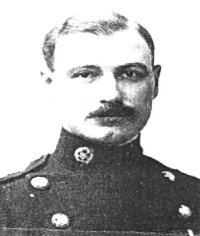
ALFRED CHARLES ADDISON
There being no indigenous aristocracy in Portsmouth, some of the most influential characters in the Borough were the Members of the Council, particularly the Mayor, a role to which Alfred Addison's father Albert succeeded in 1887. This may make Alfred the only son of an ex-Mayor of Portsmouth to lose his life in the Great War.
The Addison family had been resident in Portsmouth since before the first census in 1841 which listed Alfred's grandfather George Addison, his wife Matilda and one year old daughter, also named Matilda, living at 23 Prospect Row, Old Portsmouth, which was also known as the Blacksmith's Arms. George was recorded as being the Publican which must have been a difficult job as Prospect Row was then a by-word for notoriety. George had actually been born in Gosport in 1817, but the Portsmouth connection was taken further back by his wife Matilda who was born in Portsea in 1819.
The 1851 census tells us that George and Matilda had moved to another pub, the Royal Standard, at 189 or 190 Queen Street which was not a significant move upmarket. By that date Matilda had given birth to a son, Albert, the future mayor, and later (in 1854) had twin boys, Jospeh and John. The family remained at Queen Street until the late 1860s after which they retired from the publican's trade and moved to Kingston Crescent where George died in 1870.
Given the family background it seems amazing that Albert Addison should be able to leap from his humble origins to become an articled solicitor in Greenwich by the age of 21 years. This must be due, at least in part, by his fortuitous marriage to Annie Kate Bramsdon at Havant in 1869. Annie was the daughter of John Bramsdon, a brewer and the brother of Joseph Bramsdon, solicitor and MP for Portsmouth. As Joseph had not been born until 1857 it was probably Albert that introduced him to a solicitor's career.
Albert and Annie did not stay long in Greenwich, having returned to Portsmouth well before the 1881 census when they were recorded living at 1 St Andrews Road with their first six children, Kate, George, Gertrude, Albert, Edith and Alfred Charles who was born in 1879. By 1881 the family had moved to St. Lawrence, a large house on Queen's Crescent, Southsea, the same year that Albert began his political career when he was elected Councillor for the St. Jude's ward. He was elected Mayor of Portsmouth in 1887. By 1891 the family had expanded by the addition of three more children, Madeleine, Archibald and Gerald.

In 1890 Alfred Charles joined Portsmouth Grammar School where he achieved a high grade in arithmetic but was rather mediocre in other subjects. In 1896 his father Albert died and on leaving school he enlisted in the army and was gazetted to the Hampshire Regiment in February 1899. He served during the South African War where he was promoted to Lieutenant in September 1900 and again, after the war, to Captain in September 1904.
At the outbreak of the Great War the 2nd Battalion of the Hampshire Regiment was based in India from where they were recalled in November 1914. Four months later they were despatched to the Dardenelles where on 25th April 1915 Captain Addison took part in the landing at V Beach in Galipolli but was killed the next day whilst involved in fighting at Seddülbahir, a victim of a Turkish grenade. He was buried at V Beach Cemetery.
Further Information
The Commonwealth War Graves Commission (CWGC) website lists Captain Alfred Charles Addison, 2nd Battalion, Hampshire Regiment, date of death, 25/04/1915, buried in the V Beach Cemetery, Turkey (Grave ref: O.2.). Son of Annie Kate Addison, of "St. Lawrence." Queen's Crescent, Southsea, Portsmouth, and the late Albert Addison.
Alfred Addison is remembered on the St. Jude's Church WW1 Memorial, the Portsmouth Grammar School WW1 Memorial and on the Cenotaph. He is not listed in the 'National Roll of the Great War'.
Tim Backhouse
August 2014